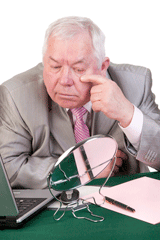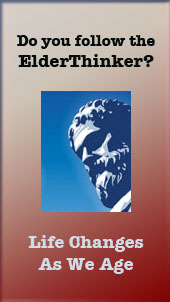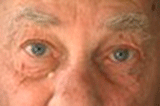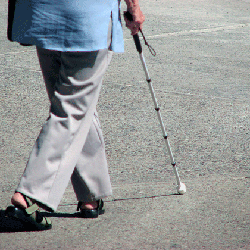To be truthful, I didn't know the difference between an Optometrist and an Ophthalmologist (much less how to spell them) when I went to get new glasses a few months ago. I was about to find out.
I usually visited my Optometrist every two or three years for new glasses and contact lenses. I wanted to be fashionable, and I have something called Astigmatism which means I have to get progressively stronger lenses. About eight out of ten people who wear glasses have some form of Astigmatism.
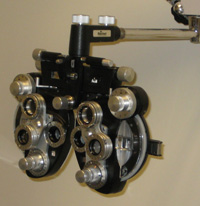
During my last visit to the Optometrist, I followed the usual pattern, waiting in an attractive area filled with glass shelves displaying the newest fashionable frames. Then the doctor's assistant took me to a private area and tested my eyes for Glaucoma with an air puff. Finally I was seated in a dimly lit examining room where the Optometrist examined my eyes and vision. "Which is best," she would say, "one or two." As she clicked the lenses back and forth. Most of us have these tests many times as we grow older. We get a new prescription for lenses and choose new frames as a reward.
This time, after she turned the lights back on, she said, "I don't like your eye pressure. Let's test it again to be sure." I was so surprised by this departure from the routine that I didn't ask a single question. I followed her down the hall where she managed the air puff machine herself this time. "Your eye pressure is high. I'd like to refer you to a specialist," she said. "You could have Glaucoma."
This was new and unfamiliar
Going to a specialist was new and unfamiliar territory for me. This doctor is called an Ophthalmologist and he is a physician with a specialty in diseases of the eye and eye surgery. The physician I chose also has an additional specialty on top of that, which means an extra year or two of study in the field of Glaucoma.
I was a little nervous too. When I was growing up, people with Glaucoma went blind. I had done some research on the web and brought along a list of questions.
Checking in was like going to any MD's office and somehow the routine of filling out forms and sitting in a waiting room comforted me a little. I didn't have to wait long. A young man soon called my name and escorted me to an examining room. He explained that he is one of the doctor's technicians and he would be doing some preliminary tests. I learned later that he is a Certified Ophthalmic Technician.
The technician asked some basic questions (like my age) and asked me what I thought was wrong with my eyes, and about family history with Glaucoma. I could see that he was taking very careful notes. He looked in my eyes with a light, then numbed them with some eye drops that stung just a little. Then he measured my eye pressure with a probe called a tonometer that actually pressed against my corneas. I could not feel it because of the eye drops and it must have been very gentle because my eyes didn't feel irritated later on.
Next he took me to a machine where I look through a viewer at a big white screen one eye at a time. He gave me a clicker that I was supposed to press every time I saw movement. This is called the Humphry Visual Field Test and it's designed to test peripheral vision. Peripheral vision, or seeing things out of the corner of your eye, fails as Glaucoma progresses.
After that test, he seated me in front of an FTD (Frequency Doubling Technique) machine. I saw patterns of flickering black and white bars and once again responded with a clicker whenever I saw movement. This machine tests the sensitivity (and therefore the thickness) of the retinal nerve. Glaucoma causes thinning and loss of sensitivity to this part of the eye.
Using my last machine for the day, he took digital photos of the inside of my eyes. Basically, he used a fancy camera to take photos through the iris (black part in the middle) of each eye. These photos, taken every few months, allow the doctor to measure changes to the optic nerve and surrounding blood vessels and tissue.
At last I saw the Ophthalmologist himself. He is a serious and also likeable person. He reviewed the technician's notes and all the test results. He pulled the images of my eyes up on a computer screen and looked them over. "Your eye pressure is high," he said, "but I do not see the damage Glaucoma normally causes so we have found this out early. I will prescribe eye drops for you. I'd like you to come back in ten days to check your eye pressure again. If the drops are working, and I think they will, I will recommend that you come back every six months for follow up."
"How long will I need to do this?" I asked him.
He answered, "For the rest of your life."
That was nearly two years ago. I put one eye drop in each eye at bedtime every night. They are painless. I've been back three times for tests on the interesting machines at the clinic. A few weeks ago, the technician spent a couple of hours with me talking about the different tests that we can have done at the clinic. I took a few photos and have written about the details for anyone who wants to know more.

